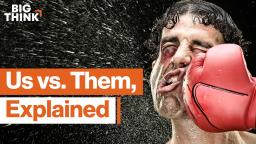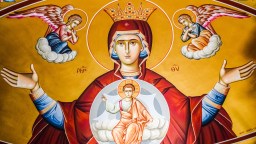When the AIDS pandemic hit in 1981, the LGBTQ community was turned upside down. American actress Judith Light recalls the horrifying wave of death that swept through the community—but from that devastation, she witnessed a new force emerge. Pushed to be self-reliant in the absence of outside help, the LGBTQ community banded together and “became this magnificent example to the world of how to be of service,” Light says. Elizabeth Taylor appealed to Congress for funding to fight the AIDS crisis, Larry Kramer founded the direct action advocacy group ACT UP to bring about legislation and medical research, and artists told the powerful stories of themselves and the ones they loved to help people understand why compassion was warranted. “I began to see that we were, by the example of the LGBQ community, we were one human family,” says Light. Since then the LGBTQ community has not stopped being a force for progress and compassion, but there is much further to go, she says. Trans people are currently on the frontline of a struggle for public compassion and acceptance, and Light—who stars in Amazon’s comedy-drama series Transparent—naturally has much to say about defeating bigotry, serving the community, and the immense courage of the trans people who come out to live authentically.
Judith Light: For the LGBTQ community, for those of us who were inspired by the way the community operated during the height of the AIDS pandemic, there was a world that we were living in where people were dying in droves, and we were at several funerals a week and we were looking at a government that has talked about how “compassionate” they are, and there was no compassion coming to this community.
And so there were pieces that were being written, places in which you were beginning to see that people were looking at this community in a new way. I mean, you look at Elizabeth Taylor and how she dealt with Rock Hudson and how she would go to Congress and talk to them about getting money and funding, and there was Larry Kramer, and my friend Paul Monette who wrote the book 'Borrowed Time: An AIDS Memoir' and 'Becoming a Man: Half a Life Story', and you’re watching a community become a force, banding together to operate at a level of community and commitment to each other when there was no help forthcoming from anywhere else.
You saw Cleve Jones create the AIDS quilt, The NAMES Project, the AIDS Memorial Quilt. You saw Larry Kramer’s 'The Normal Heart', and then you saw it brought back to Broadway years later and then Ryan Murphy turned it into the HBO movie.
You saw Ellen DeGeneres talk about being gay and coming out on television, 'Will and Grace', Ellen on the cover of Time. And what happened was the community began to take itself as a profound, powerful non-victim; assertive in the world. You saw Larry Kramer—you saw Act Up get created. You watched people take care of their own. You saw families torn apart and parents not coming to the deathbed of their sons because when they found out that they had AIDS that meant that they were gay, and they cut them off.
So we were living in a world in which a community was turned upside down and became this magnificent example to the world of how to be of service. And I said to myself, “I want to be there to be a support in anyway that I can.” And watching that and seeing that and knowing that I wanted to be part of a community that so inspired me with the way that they were operating, and you began to see all of these stories come up in our business, you know, on Broadway, plays and television and films and movies—I mean, Tom Hanks winning the Oscar for 'Philadelphia'. You were watching something happen where I began to see that we were, by the example of the LGBQ community, we were one human family. We were, all of us, in this. And everybody said, “if one of us has AIDS, everybody has AIDS,” and everyone took that seriously.
And then you begin to see organizations popping up all over the place. I mean in Los Angeles we were cooking for people and delivering meals and that was Project Angel Food, and then here you had God’s Love We Deliver and you watched people rally to each other and care from a depth of compassion that had not been seen before. And so those were the examples that I would say really started to move from a community out into the world.
And don’t think we’re far enough yet. I think we have farther to go. The fact that we have same-sex marriage is just wonderful and due to the absolute diligent work of so many people in the community. The demonstration to me about how we remove bigotry and prejudice and divisiveness and cruelty from the system, from all of our systems around the world, this is the demonstration of where it is happening and we’re not there yet. And that’s why, for me—not why but the fact that I am on a show like 'Transparent' that you can see on Amazon Prime—and some people know it and some people don’t know it. And people laugh at me when I say, “I’m on this show” and then go, “Yeah, yeah, yeah we know it.” But when you see that the time has come, “It is an idea whose time has come,” like Victor Hugo said, all of a sudden we are in this new zeitgeist of something that’s happening.
Jeffrey Tambor described it, he said— when 'Transparent' came on he said, “The arrow had already been shot from the bow, we were riding on the arrow. It had already happened in the zeitgeist.” And when you have somebody like Jill Soloway whose parent comes out at 70 years old and says, “Actually this is who I really am,” and what does it mean to tell your family member, “The person you thought I was, that’s not who I am. I will be brave enough, courageous enough, out in the world enough, longing to not be on my deathbed and think, 'What if I don’t do this, will I regret it? I want to live the life I want to live. I want to live free and I want to live true to myself. I want to be authentic.'" That to me is the most remarkable courage in the community because they are saying, “I am this person. This is who I am—and will you still love me if I tell you who I really am?” And isn’t that what we all want? That we want to be loved for all of who we are?
So I think more work needs to be done. We’re still doing it to the degree that we can. Somebody in our community, Michael Friedman, the genius who wrote 'Bloody Bloody Andrew Jackson' just passed away from AIDS complications a few days ago. We’re still in it, and we are called to come from the better angels of our nature.





